‘Game changer’: How far could you go to cut back on spending?
Save articles for later
Add articles to your saved list and come back to them any time.
As Australians across the country tighten their belts after a relentless run of interest rate rises, some are challenging themselves to spend as little as they can for a month – or in some cases even longer.
For those feeling up for the challenge, spending cutbacks include clothing, restaurants, beauty care, entertainment, home decor, holidays or impulse buys. Spending on essential items, such as mortgage, rent, utilities, insurance childcare, groceries and fuel, is permitted.
Single mother of one Alisha Burns challenged herself to cut her grocery spending.Credit: Jason South
Single mother of one Alisha Burns says the experience has been a game changer. Burns set herself a challenge to cut her grocery spending to $50 a week. One takeaway meal, cleaning essentials and pet food were in addition to the budget.
“I was regularly spending over $150 a week on food for myself and my three-year-old daughter. Wasting money on processed food and takeaways. I was getting very conscious of not having enough savings to support the goals. With mortgage rates increasing, I wanted to make sure I had reserves to absorb those costs,” she says.
Her goal was to stick to the challenge for a month and to save $100 each week.
“I’m 14 weeks in and have managed to stick to the $50 except twice. I’ve saved $1330 so far – which means I can pay for flights and use frequent flyer points to Bali next year and buy a new vacuum cleaner. I’m sticking to the challenge for another month.”
The experience has made Burns realise that she had become an impulsive spender.
“I’ve learnt that I’m an impulse shopper and cannot be trusted in stores. The only way I stick to the budget is to check price per unit, buy specials and determine my meal plans weekly. I’m now baking most weeks with my daughter, and we’re enjoying the process of baking together.”
The Australian Bureau of Statistics found employee households recorded the largest annual rise in living costs of all household types, rising 9 per cent over the year, down from a peak of 9.6 per cent in the June 2023 quarter.
Similarly, a major 2023 study from the Australian National University (ANU) and the Scanlon Foundation Research Institute revealed two in five Australians, 41 per cent, described themselves as either poor, struggling to pay their bills or just getting by in 2023, up from 37 per cent in 2022.
Mother of two young boys Celeste Millar started the challenge because her spending was out of control.
“I had a budget of $150 a week, but regularly spent double that. I couldn’t achieve my financial goals due to the unpredictable spend. I’m a single mum and have a sizeable mortgage which has been a source of stress, along with cost-of-living increases.”
The working mum decided to meal prep and stock up on supplies by buying bulk, opting for a 12-week meal plan to follow the school term and supplementing with a $50 grocery spend. Since starting the challenge, she said the biggest shift was her mindset.
“This exercise has really been successful in shifting my spending. Previously I was very focused on convenience and didn’t put any limits on what we could have. If we felt like steak for dinner, then I’d go and buy expensive eye fillets.”
Millar shops with her freezer in mind and plans her weekly meals.
“I only buy supermarket brands now. My kids tell me the Coles and Woolies brand chips are actually nicer than the more expensive brands, that’s been a huge win! If I can make it from scratch, I will.”
The savings from her cutbacks have helped with her debts.
“So far, I’m $1000 down on my credit cards. I also am planning to take two holidays in the next eight months. One of which will be 60 per cent funded by my grocery savings.“
- Advice given in this article is general in nature and is not intended to influence readers’ decisions about investing or financial products. They should always seek their own professional advice that takes into account their own personal circumstances before making any financial decisions.
For expert tips on how to save, invest and make the most of your money, delivered to your inbox every Sunday, sign up for our Real Money newsletter here.
Most Viewed in Money
From our partners
Source: Read Full Article


